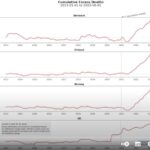Going Green in Your Home
Practical information and links on: heating & cooling, appliances, flooring, lighting & electricity, water conservation, recycling, composting and solar energy.
Read MoreAug 14, 2019 | (Universal)
Practical information and links on: heating & cooling, appliances, flooring, lighting & electricity, water conservation, recycling, composting and solar energy.
Read MoreAug 14, 2019 | (Universal)
“Most cities have incredible restaurants that are either all-vegan or can create fantastic vegan dishes. You just have to know how to find them. Of course, Google is a great first option, but here are some other great ways that should help”
Read MoreAug 14, 2019 | (Universal)
“Global Voices is an international and multilingual community of bloggers, journalists, translators, academics, and human rights activists. Together, we leverage the power of the internet to build understanding across borders.”
Read MoreAug 14, 2019 | (Universal)
“Welcome to the global issues web site. This web site looks into global issues that affect everyone and aims to show how most issues are inter-related. There are over 550 articles on this site, mostly written by myself. The issues discussed range from trade, poverty and globalization, to human rights, geopolitics, the environment, and much more. Spread over these articles, there are over 7,000 links to external articles, web sites, reports and analysis to help provide credence to the arguments made on this web site.”
Read MoreAug 14, 2019 | (Universal), CNCL-Endorsed
“A new international report linking obesity, undernutrition and climate change is calling for strong global actions that address all three issues at once.”
Read MoreAug 14, 2019 | (Universal)
“Each year, more than 1 billion rabbits and 50 million other animals — including foxes, seals, mink, and raccoon dogs — are raised on fur farms or trapped in the wild and killed for their pelts. Because much of the fur is imported from China and other countries that have poor regulation, it is often mislabeled as “faux”. Depending on the size of the garment, 100 animals or more may be killed for a single coat.” Article covers: farm conditions, trapping and hunting, the fur trade today
Read MoreAug 14, 2019 | (Universal)
“The Gaia hypothesis, also known as Gaia theory or Gaia principle, proposes that all organisms and their inorganic surroundings on Earth are closely integrated to form a single and self-regulating complex system, maintaining the conditions for life on the planet. The scientific investigation of the Gaia hypothesis focuses on observing how the biosphere and the evolution of life forms contribute to the stability of global temperature, ocean salinity, oxygen in the atmosphere and other factors of habitability in a preferred homeostasis. The Gaia hypothesis was formulated by the chemist James Lovelock and co-developed by the microbiologist Lynn Margulis in the 1970s. Initially received with hostility by the scientific community, it is now studied in the disciplines of geophysiology and Earth system science, and some of its principles have been adopted in fields like biogeochemistry and systems ecology. This ecological hypothesis has also inspired analogies and various interpretations in social sciences, politics, and religion under a vague philosophy and movement.” 15 page pdf
Read MoreAug 14, 2019 | (Universal)
Full Day Direct Action Training Agenda
Read MoreAug 14, 2019 | (Universal)
“Along with climate change, perhaps the most pressing concern we have regarding sustaining our lives, and future life on earth, is our supply of fresh water. From 1941 to 2011 the world’s population has tripled, but freshwater consumption has quadrupled, which is predicted to leave forty percent of the world’s population facing severe water stress by the year 2020….The long-term solution to our looming freshwater crises can be found on our plates. Why wait until we run out of water? Make the change to a water-smart, purely plant-based diet today—and then inspire others to do the same!”
Read MoreAug 14, 2019 | (Universal)
“Many people assume that free range farming gives animals a happy life, free of the cruelty their factory farmed kin suffer. However, there are some important things you should know before choosing this option.”
Read MoreAug 14, 2019 | (Universal)
Chapter available as PDF “Four dimensions of nonviolent action: A sociological perspective”
Read MoreAug 14, 2019 | (Universal)
“The Foundational Research Institute (FRI) seek to identify and prioritize effective and cooperative strategies for reducing involuntary suffering. Due to the enormous ethical importance of the long-term future, their research focuses on the risks for dystopian futures, especially those arising from new technologies such as artificial intelligence.”
Read MoreAug 14, 2019 | (Universal)
“a kids’ meal plan as well as fun ways to introduce the great fruit and vegetable adventure to young children”
Read MoreAug 14, 2019 | (Universal)
“Was that fish on your plate once a sentient being? Scientists have long believed that the animals aren’t capable of the same type of conscious thought we are because they fail the “emotional fever” test….their study upends a key argument against consciousness in fish”
Read MoreAug 14, 2019 | (Universal)
Fighters (MMA, BJJ, Wrestling, KickBoxing etc) who are vegan or vegetarian.
Read MoreAug 14, 2019
“Hi everybody! We are a vegan farm animal sanctuary in Otaki, just over an hour drive from Wellington. Every day we care for over 200 animals (ponies, cows, goats, pigs, sheep, chickens, ducks, cats, bunnies and more) who have been abandoned, injured or mistreated. We are looking for people, either single or a couple, to come and join us for a minimum of a month. If you are the right fit there might be a more permanent place for you – some people choose to stay for a year or more.”
Read MoreAug 14, 2019 | (Universal)
Facilitation Training “description: Share stories, tactics, and tools from your past facilitation experiences. Troubleshoot your gnarliest facilitation challenges with experienced peers. Be visited by the facilitation fairy, who will bestow gifts of insight into the secret lives of groups! Gain access to follow-up resources for facilitators.”
Read MoreAug 14, 2019 | (Universal)
“Factory farms pollute the environment and our drinking water, ravage rural communities, and harm the welfare of animals—while increasing corporate control over our food. Factory farming is an unsustainable method of raising food animals that concentrates large numbers of animals into confined spaces. Factory farms are not compatible with a safe and wholesome food supply. It’s time to ban factory farms.”
Read MoreAug 14, 2019 | (Universal)
“From shopping compassionately to cooking delicious vegan meals for friends, acting to help animals is easy and fun!”
Read MoreAug 14, 2019 | (Universal)
“Each year, more than 100 million animals—including mice, rats, frogs, dogs, cats, rabbits, hamsters, guinea pigs, monkeys, fish, and birds—are killed in U.S. laboratories for biology lessons, medical training, curiosity-driven experimentation, and chemical, drug, food, and cosmetics testing. Before their deaths, some are forced to inhale toxic fumes, others are immobilized in restraint devices for hours, some have holes drilled into their skulls, and others have their skin burned off or their spinal cords crushed. In addition to the torment of the actual experiments, animals in laboratories are deprived of everything that is natural and important to them—they are confined to barren cages, socially isolated, and psychologically traumatized. The thinking, feeling animals who are used in experiments are treated like nothing more than disposable laboratory equipment.”
Read MoreAug 14, 2019 | (Universal)
“The magnitude of an animal welfare problem may be assessed as the product of the severity of suffering, its duration and the numbers of animals affected. Previous studies suggest that fish experience pain and fear and that, for commercially-caught fish, the severity and duration are likely to be high. This study seeks to assess the numbers of such animals…It is concluded that the number of fish represented by average annual recorded capture tonnage (1999-2007) is of the order of a trillion. This figure does not include fish caught in unrecorded capture nor the unaccounted numbers of fish that escape from fishing gear but are fatally stressed or injured in the process… ” (18 page pdf)
Read MoreAug 14, 2019 | (Universal)
“Use the calculator below to see the impact you will have on the planet if you decide to go vegan. And if you are vegan, you can use the calculator to see what kind of impact you are already having. Please share this calculator with your friends and show them that the devastation of our planet – the oceans, the air, the rainforests – is very real. This is not solely about how much we care about animals, it is also about how much we care about the planet that supports our existence and provides the air that our children and their children will breathe.”
Read MoreAug 14, 2019 | (Universal)
“Many Western philosophers admit that Buddhism is a rich philosophy. It has a plausible theory of personal identity: the separate self is merely a conventional concept, which can become dangerously addictive. It also contains a theory of wellbeing: the ideal state is the calm contentment that comes with realising one’s deep interconnections with the rest of the world.1 But can Buddhism make important contributions to the field of political philosophy?”
Read MoreAug 14, 2019 | (Universal)
EFF’s Top 12 Ways to Protect Your Online Privacy
Read MoreAug 14, 2019 | (Universal)
“There are many egg substitutes available when a recipe calls for eggs. All these egg substitutes can be easily purchased from your grocery stores and health food stores.”
Read MoreAug 14, 2019 | (Universal), CNCL-Endorsed
Interview with Mike Joy (ecologist) “Many parts of New Zealand may be past the ‘agricultural tipping point’ according to author and ecologist Mike Joy, who says our agriculture system needs to undergo drastic changes.”
Read MoreAug 14, 2019 | (Universal)
“Ji misawaabandaaming, or how we envision our future, is a worldview of positive thinking. It’s an Anishinaabe worldview, coming from a place and a cultural way of life that has been here, on the same land, for 10,000 years. To transform modern society into one based on survival, not conquest, we need to make some changes. We need to actualize an economic and social transformation. Restoring an economics, which makes sense for upcoming generations, needs to be a priority. In our community, we think of this as economics for the seventh generation.”
Read MoreAug 14, 2019 | (Universal)
“This Easy Beginner Vegan Shopping List will show you a plethora of options and make shopping a breeze! I’ll also give you some pointers along the way that should be helpful for beginners and experienced vegans alike.”
Read MoreAug 14, 2019 | (Universal)
“The choices we make about our food matter. The meat and dairy industry’s relentless quest for profit is putting all of us at risk as enormous factory farms force cheap, health-threatening products into our grocery stores and onto our plates. It’s time to choose a better way.”
Read MoreAug 14, 2019 | (Universal), CNCL-Endorsed
“Follow the quiz and see the impact you are having on the planet!”
Read MoreAug 14, 2019 | (Universal)
“Distributed electricity generation (local, decentralized energy production) has the potential to radically alter America’s energy landscape. Our current energy mix is dominated by large, remote, centralized power facilities such as nuclear, gas, and coal-fired power plants, as well as massive wind farms and transmission infrastructure. Today, improved technologies, environmental and economic concerns, and a recognition of the vulnerabilities in large centralized power production make distributed generation coupled with efficiency upgrades a viable and, in fact, preferable alternative. Every properly situated building, parking lot, and
brownfield (disused, contaminated land) in our communities can potentially become a producer of energy.”
Aug 14, 2019 | (Universal)
“Some of the questions we should answer when planning an effective nonviolent direct action”
Read MoreAug 14, 2019 | (Universal)
“Democracy Now! produces a daily, global, independent news hour hosted by award-winning journalists Amy Goodman and Juan González. Our reporting includes breaking daily news headlines and in-depth interviews with people on the front lines of the world’s most pressing issues. On Democracy Now!, you’ll hear a diversity of voices speaking for themselves, providing a unique and sometimes provocative perspective on global events.”
Read MoreAug 14, 2019 | (Universal)
“Ecological economists have emphasized the study of commodification (i.e., the development of market-based exchange and valuation) rather than decommodification processes (i.e., the degree of immunization from market dependency). This is surprising given the fact that large-scale decommodification may be our best option for a post-growth transition so dear to many ecological economists. Based on Heinsohn and Steiger’s theory of ownership, we seek to provide an institutional foundation to processes of (de)commodification. These two authors distinguish between ‘property’ and ‘possession’, two bundles of rights generating different logics and consequences. We illustrate this approach with three cases taken from an advanced capitalist economy, Switzerland, showing how commodification and decommodification processes may appear together or vigorously oppose each other. Cooperatives, forests and municipal land are examples of (partial) decommodified assets that follow a logic of possession and are therefore more likely to be sustainable. It is high time that the study of decommodification becomes central to ecological economics.”
Read MoreAug 14, 2019 | (Universal)
Video and article on the cruelty of egg farms.
Read MoreAug 14, 2019 | (Universal)
“When you choose Cynthia King Vegan Ballet Slippers, you have taken a graceful step towards reducing cruelty to animals and improving our environment. You not only help save the lives of the animals used in the production of shoes, but you also help to conserve the habitat of many others. Gorillas, chimpanzees, and many other species face deforestation and homelessness every day due to unnecessary destruction of their habitats for livestock production. Waterways around the world continue to suffer lingering effects of pollution from factory farms and tanneries, some closed generations ago. Using cruelty free ballet slippers directly conserves natural resources and saves lives.”
Read MoreAug 14, 2019 | (Universal)
2 videos: “Thich Nhat Hanh on Compassionate Listening – Oprah Winfrey Network” and “Conversations on Compassion with James Doty, MD, and Thich Nhat Hanh” and a link to article “Practising Listening with Empathy, by Thich Nhat Hanh”
Read MoreAug 14, 2019 | (Universal)
“The term “cruelty-free product” is generally understood within the animal rights movement as a product that has not been tested on animals by the manufacturer. While you may not have a special affinity for rats, guinea pigs or even rabbits, it’s important for you to know that dogs, cats, and primates are all used in laboratory testing, and the tests are inhumane.” Includes: Gray Areas, Cruelty-Free v. Vegan, Companies v. Products, Where to Buy Cruelty-Free Products
Read More US Admits to Pushing Ukraine Into a Fight It Can’t Win
US Admits to Pushing Ukraine Into a Fight It Can’t Win We’re Taught About Liberal And Conservative Bias In Media, But Not US Empire Bias
We’re Taught About Liberal And Conservative Bias In Media, But Not US Empire Bias Across the West, People Are Dying in Greater Numbers. Nobody Wants To Learn Why
Across the West, People Are Dying in Greater Numbers. Nobody Wants To Learn Why The Imminent Extradition of Julian Assange and the Death of Journalism
The Imminent Extradition of Julian Assange and the Death of Journalism Another Act of Terror. How the Media Do PR for Biden and Zelensky
Another Act of Terror. How the Media Do PR for Biden and Zelensky Safety Third
Safety Third How BBC Coverage Is Enabling Israeli State Violence at Al-Aqsa
How BBC Coverage Is Enabling Israeli State Violence at Al-Aqsa It’s Not Just the Settlers – or Israel – Responsible for the Torching of Huwwara
It’s Not Just the Settlers – or Israel – Responsible for the Torching of Huwwara Caitlin Johnstone: Notes From The Edge Of The Narrative Matrix
Caitlin Johnstone: Notes From The Edge Of The Narrative Matrix Woke Imperialism
Woke Imperialism